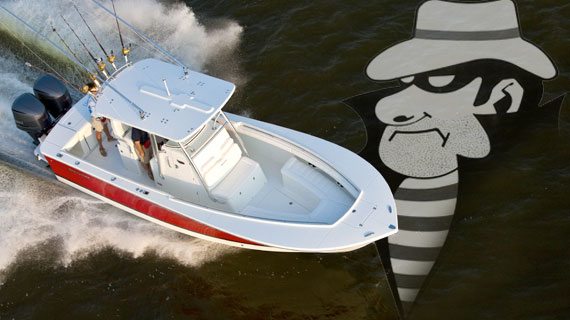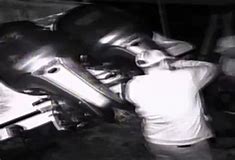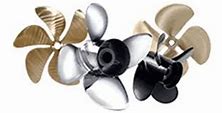
As a private investigator in Portland, Oregon people hire me to investigate a wide variety of cases: missing persons, child custody, surveillance, etc., but most of my cases involve some type of fraud or theft. I recently received a call from a very perturbed sounding man who wanted me to “catch” the person who stole his outboard motor.
I am a recreational boater and fisherman and own a boat so I know how expensive new (or even used) outboard motors are. Even a small 20 – 30 HP outboard can easily retail for 4-5 thousand dollars, so I can understand why this man was so upset.
I learned that he had been fishing at a local river and parked his boat in the parking area just like every other boater. At the end of the day he hauled his boat home and parked it in his driveway. Nothing unusual about that.
Then the next day he went outside and noticed that his 50 HP Mercury outboard was missing – just gone. Someone had cut the control cables and just lifted his motor off his boat. A 50 HP motor weighs about 250 lbs. so the thief must have been big and strong or there were two thieves. Was his outboard locked to the transom? Sadly, no.
From the engine oil drops I noticed on the driveway I concluded that the thieves likely first cut the control cables and unscrewed the bolts securing the motor to the transom. Then, they backed their vehicle (likely a PU truck) into the driveway and lifted the motor into the bed of the truck. The whole process likely took less than 5 minutes. Five minutes of “work” for several thousand dollars is not a bad haul for a crook!
What made this man even more angrier was that three days after here replaced his outboard, someone stole the propeller off of his new motor while it was at the river parking lot area! What a streak of bad luck. Someone steals your outboard. You spend thousands of dollars to replace it and then someone steals the $200 prop off of your new motor. Yikes!
 In investigating this case I was able to develop a suspect but was unable to recover my client’s stolen outboard and propeller. My investigation revealed that a tandem team of thieves would cruise the boat parking lot and identify outboard motors they wanted to steal. When the boat owner would leave the parking area they would then follow the boater home. Then they would come back in the dead of night and steal the outboard. I suspect that sometimes they would just steal the props off outboards – especially if the outboard was locked to the transom.
In investigating this case I was able to develop a suspect but was unable to recover my client’s stolen outboard and propeller. My investigation revealed that a tandem team of thieves would cruise the boat parking lot and identify outboard motors they wanted to steal. When the boat owner would leave the parking area they would then follow the boater home. Then they would come back in the dead of night and steal the outboard. I suspect that sometimes they would just steal the props off outboards – especially if the outboard was locked to the transom.
Before I worked on this case, outboard propeller theft was something that I have never given much thought but I  learned that it is a very real problem and many THOUSANDS of boat propellers are stolen each year.
learned that it is a very real problem and many THOUSANDS of boat propellers are stolen each year.
Why is outboard motor theft and propeller theft so rampant? Thieves are opportunists and like “big-money” items that can be easily stolen and easily sold or traded. Outboard motors are valuable costing several thousand and are easily removed from a boat (especially the smaller ones) in just a few minutes. Many propellers cost hundreds of dollars and can be removed in less than a minute by just unscrewing a simple nut.
Outboard motors have serial numbers and if the owner has recorded the serial number and reports the theft to the police there is a remote chance that someday the motor might be recovered but propellers have no serial numbers and are untraceable.
Tips to prevent outboard and propeller theft:
* LOCK your motor to your boat’s transom. If possible use more than one lock.
All locks and security measures can be defeated by an ingenious and determined thief. Fortunately, most thieves are lazy. They are attracted to valuable “big ticket” items that are easy to steal. Some thieves will bring tools and cut locks but most will simply move on to an easier target once they see that it will take real time and effort to steal the item. Why make it easy for a thief?
* LOCK your propeller to your motor.
Propeller locks are inexpensive (usually less than $50.00). They provide another layer of protection. Why make it easy for a thief?
* ALARM YOUR MOTOR
Consider hiding a GPS locater inside your motor. If a thief takes the time to defeat your locks (unlikely) and the motor is stolen a GPS locater with an accelerometer movement alarm can notify you via smartphone and track the motor wherever the thief takes it. This will greatly increase your chances of identifying the thief and recovering your motor.
If you decide to get an alarm & GPS tracker invest a little time and effort in selecting one that will do what you want. Some have limited range and are unreliable but there are a number of good alarms & GPS devices that sell for less than a few hundred dollars. Investing a few hundred dollars to protect an item that costs a few thousand to replace is a good investment. Do your research.
* THINK ABOUT WHERE YOU PARK OR STORE YOUR BOAT
Marine motor theft can occur at anytime of the day or night but often thieves operate under cover of darkness when most boat owners are asleep. When storing your boat in a driveway or storage yard, store it in a well-lighted area. Instead of using traditional white-light flood lights, consider using blue light bulbs as research has shown that blue illumination is more effective at deterring crime than traditional white-light illumination.
* If practical consider backing your boat up to a structure like a garage or a solid structure like a sturdy wooden fence. This will make access to your motor harder and crooks will not be able to simply back up a truck right up to your transom and slide the motor into their get-a-way vehicle.
- SURVEILLANCE CAMERAS
Research shows that surveillance cameras have very little crime deterrent effect but they are very helpful in investigating the theft and greatly enhance the chance of identifying the thief(s) and recovering your stolen property. If you want any chance of getting your stolen property back, install quality surveillance cameras.
Use Layers of security
One basic principal of physical security is the concept of layered of security. If one security device is defeated or malfunctions, another device or “layer” of security remains to protect your property.
Lock your motor and propeller.
Alarm your motor.
Give consideration where you park or store your boat.
Use blue light illumination to deter theft.
By taking these simple and relatively inexpensive security measures you can’t stop a crook from being a thief, but you can lower your odds of becoming a marine theft victim.




